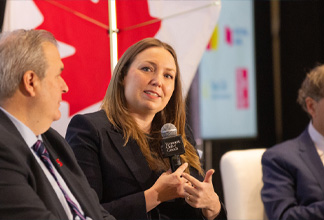Warm, Hot, Cold? A Temperature Check on Canada's Housing Market
Written by The Content Team
Published on April 12, 2019
minute read
Share:
Thinking about buying a home in Canada? The latest RBC Housing Trends and Affordability report may have some good news for you.
After years of climbing out of reach for many Canadians, home prices recently began creeping in the other direction, becoming more affordable in most of the country. And on top of that, the report found that prices are likely to become more affordable yet, with household incomes expected to step up.
Here are five interesting things to learn from the report:
It's not all good news.
How much of your household income would you need to cover the costs of owning a home? That's the affordability measure. Across Canada, the answer in the fourth quarter of 2018 was 51.9 per cent – a drop of 0.7 percentage points from the third quarter. For potential buyers, that's some relief, though it doesn't tell the whole story.
For starters, at 51.9 per cent, the cost of owning a home is still a stretch for many. And keep in mind, that's a Canada-wide figure. The percentage required where you live might be considerably higher. (Or, possibly lower. More on that later.)
RBC measures affordability by weighing how much median pre-tax household income is needed to cover mortgage payments, property taxes and utilities for an average-priced home in a particular market.
In Canada's most expensive cities — Vancouver, Toronto and Victoria — affordability measures are still at "crisis levels," at 84.7 per cent, 66.1 per cent and 60 per cent, respectively. Montreal, meanwhile, at 44.5 per cent, is outpacing its long-run average.
Condos may no longer be the affordable option.
It used to be that buying a condo was a happy alternative for people who were ready to stop renting but who couldn't afford the monthly outlay on a single-family home. Monthly condo ownership costs were often comparable to apartment rent.
But last year, buyers of an average condo in Vancouver, Toronto, Victoria and Montreal were paying about $900 more per month compared to apartment renters, the economists found. Condo demand has swelled, and that premium has puffed up with it.
The implication? Expect rental demand to heat up.
Why Vancouver, Toronto and Victoria are softening.
Home prices in Vancouver, Victoria and Toronto eased in the fourth quarter, but not enough to make a difference for most buyers. In all three markets, home-sales activity sputtered, choked by tighter rules in British Columbia, the federal government's mortgage stress test, and affordability rates that discourage would-be buyers.
More recently, in Vancouver, where the RBC economists said housing is in "full-blown correction mode,"resales dropped to a 33-year low in March and prices fell for a ninth-straight month. "If the reason why Vancouver buyers are staying on the sidelines is that they're waiting for more significant price breaks, that could well be what's coming," RBC's Robert Hogue said in a separate research report issued on April 3.
For the first time in years, Vancouver is a buyer's market, albeit a pricey one. Affordability improved by 2.6 percentage points in the fourth quarter, but ownership still devours 84.7 per cent of household income.
In nearby Victoria, affordability improved by 1 percentage point, to 60 per cent at the end of last year. "Some relief," RBC economists said, but one that "unlikely made any difference to the area's homebuyers."
Across the country in Toronto, meanwhile, the story was similar. Affordability improved by 1 percentage point, but at 66.1 per cent, it's still near historical highs, freezing out buyers. And economists expect Toronto prices to stay where they are for now.
What's happening in the rest of Canada.
Canada, of course, isn't all near-million-dollar homes. Most markets tracked by RBC have affordability levels within historical norms, roughly 25 per cent to 40 per cent.
However, the new stress test is having a cooling effect everywhere, the economists said. March home sales data showed little sign of the typical spring home-buying surge, despite recent declines in mortgage rates.
Winter was no better. The Canadian Real Estate Association reported that across Canada, the average home price fell 5.2 per cent in February from the same month last year. The fall came as home sales slowed, down 4.4 per cent year-over-year, for its most sluggish month since November of 2012. CREA expects Canadian home sales overall to decelerate 1.6 per cent this year, to its slowest since 2010.
There's other positive news, too.
Recent improvements in Canada's affordability rates might not be an aberration, but the start of a trend.
Though January's stronger gross-domestic-product growth helped lessen some worries about a broadly sputtering Canadian economy, RBC economists maintain a lower profile for interest rates. And they see "very little scope" for home prices to rise.
Meanwhile, with Canada's low, 5.8 per cent jobless rate, there's increasing upward pressure on wages. And with that, the economists said, "the stars are aligning for more affordability relief in the period ahead."
RBC Direct Investing Inc. and Royal Bank of Canada are separate corporate entities which are affiliated. RBC Direct Investing Inc. is a wholly owned subsidiary of Royal Bank of Canada and is a Member of the Investment Industry Regulatory Organization of Canada and the Canadian Investor Protection Fund. Royal Bank of Canada and certain of its issuers are related to RBC Direct Investing Inc. RBC Direct Investing Inc. does not provide investment advice or recommendations regarding the purchase or sale of any securities. Investors are responsible for their own investment decisions. RBC Direct Investing is a business name used by RBC Direct Investing Inc. ® / ™ Trademark(s) of Royal Bank of Canada. RBC and Royal Bank are registered trademarks of Royal Bank of Canada. Used under licence. © Royal Bank of Canada 2019. All rights reserved.
The views and opinions expressed in this publication are for your general interest and do not necessarily reflect the views and opinions of RBC Direct Investing. Furthermore, the products, services and securities referred to in this publication are only available in Canada and other jurisdictions where they may be legally offered for sale. If you are not currently resident of Canada, you should not access the information available on the RBC Direct Investing website.
Explore More

7 Ways to Get Ahead Financially in 2026
How you might invigorate your finances and put your money to work more intentionally this year
minute read

Economic Outlook: Uncertainty is Here to Stay, So What's Next?
Takeaways from the Economic Club of Canada’s Annual Event
minute read

3 things: Week of December 15
What the Inspired Investor team is watching this week
minute read
Inspired Investor brings you personal stories, timely information and expert insights to empower your investment decisions. Visit About Us to find out more.







